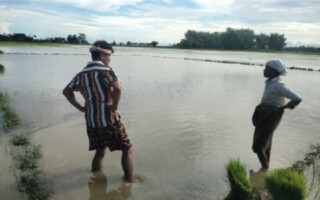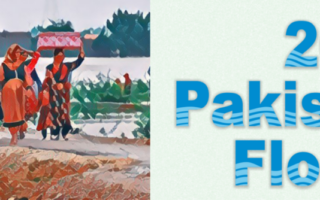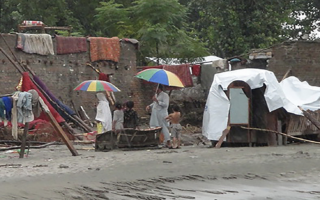
The Population, Environmental, Risks and Climate Crisis (PERCC) Initiative supports ten innovative case studies selected through a competitive process that received 160+ applications from across the globe. These community-based organization (CBO)-led projects explore the critical intersection of climate change with health—including sexual and reproductive health, rights, and choice (SRHRC), migration, and urbanization. The studies include impacts of extreme weather events like extreme rainfall, floods, droughts, and others.
What makes these studies unique is that they are locally conceived, developed, and led by the communities they come from and serve. PERCC’s researchers provide technical support, but the research questions, methodologies, and implementation are driven by local priorities and expertise. These studies span nine countries—seven in Africa and two in South Asia—generating vital evidence to strengthen local health systems and build community resilience in climate-vulnerable regions.
The PERCC Initiative also maintains a global CBOs alliance, the Continental Alliance for Climate Transformation (COACT) that unites civil society organizations (CSOs), researchers, and partners to address the complex relationship between climate change (including extreme rainfall, cyclones, floods, and others), health, livelihoods, migration, and SRHRC through collaborative, evidence-based action.
What Makes Our Approach Unique
Our case studies use mixed-method research to capture both data and lived experiences. While most studies focus on investigating how climate change affects SRHRC and strengthening local adaptation efforts in health systems, a few also explore the effects of climate change on mental health, the impact of climate-induced migration on urbanization, and how education advances resilience in both rural and urban environments. All projects foster collaboration between researchers and CBOs, ensuring that research translates to meaningful local impact.
PERCC Case Studies at a Glance
Community-Led Climate Adaptation in Kenya’s Maasai Communities
- Location: Kajiado County, Kenya
- Partner: Neighbors Initiative Alliance
- Focus: How climate change affects Maasai community resilience and access to gender-responsive services
This study examines climate impacts on pastoralist communities, focusing on gender-responsive climate policies and access to SRHRC services. The research directly engages Maasai community members to understand their unique adaptation strategies and challenges, providing actionable insights that can help dismantle gendered vulnerabilities in climate-vulnerable communities. By examining both community-led adaptation practices and policy implementation, the study aims to support more equitable and effective climate resilience strategies.
Climate Resilience of Vulnerable Groups in Cameroon
- Location: Yagoua and Douala, Cameroon
- Partner: Sustainable Impact for the Development of Africa (SIDAF)
- Focus: Climate and urbanization impacts on people with disabilities, adolescents, and girls
Exploring both rural Yagoua and informal settlements in Douala, this research identifies actionable strategies to build inclusive, climate-resilient health systems. The study examines how climate-related disruptions like floods and extreme weather affect marginalized groups differently and conducts financial analysis of investments needed for equitable access to climate-resilient health services—especially in informal settlements.
Climate Vulnerabilities of Adolescent Girls in Rwanda
- Location: Western Province, Rwanda
- Partner: Green Starz Impakt Hub
- Focus: How climate change compounds socioeconomic and health challenges for adolescent girls
This research fills crucial knowledge gaps by examining the specific vulnerabilities adolescent girls face during climate events in Rwanda’s Western Province. By identifying effective resilience strategies and policy gaps, the findings will inform targeted interventions to enhance adolescent girls’ climate adaptation capacities.
Climate Change and SRHR in Uganda: Challenges for Rural Women and Youth
- Location: Kamuli District, Uganda
- Partner: Agrovision She Farmers
- Focus: How climate change affects women and youth who depend on subsistence agriculture
This study investigates climate change’s effects on health, SRHRC, and livelihoods among women and youth in Kamuli District. By examining community-led adaptation and the effectiveness of gender-responsive climate policies, the research aims to enhance resilience and equity in these climate-vulnerable communities.
Access and Utilization of Sexual Reproductive Health Services During Cyclones in Malawi
- Location: Zomba District, Malawi
- Partner: Center for Education, Promotion & Advancement of Rights of Adolescent Mothers (CEPARAM)
- Focus: How tropical cyclones affect access to SRHRC services near Lake Chilwa
Following the devastating impacts of Cyclone Freddy in 2023, this research assesses how extreme weather disrupts SRHR service access. Using innovative methods like PhotoVoice and community human-centered design workshops, the study explores healthcare system adaptations and aims to strengthen disaster preparedness by better integrating SRHRC services with the Minimum Initial Service Package (MISP) and Sendai Framework standards.
Youth Climate Health Solutions in Tanzania
- Location: Matama District, Tanzania
- Partner: Amplify Health and Development in Africa (AHDA)
- Focus: Community and youth responses to climate-health challenges
This study engages youth and community health workers to document how climate events such as floods exacerbate disease spread (such as malaria and cholera) and hinder healthcare access. By capturing community solutions, the research builds evidence for more effective grassroots climate-health advocacy.
Climate-Induced Migration and Urban Resilience in Ethiopia
- Location: Addis Ababa, Dire Dawa, and Hawassa, Ethiopia
- Partner: Advoco Plus Health and Development Consultancy (AHD)
- Focus: How climate-induced migration shapes urban growth and resilience
Examining three, rapidly growing Ethiopian cities, this research analyzes how climate-induced rural-to-urban migration affects housing, employment, and access to services. The study aims to identify scalable solutions for equitable resource allocation and inclusive urban planning in the face of climate-induced migration.
Extreme Weather and Access to SRHRC Services for Adolescent Girls and Young Women in Uganda
- Location: Mayuge District, Uganda
- Partner: Community Concerns Uganda Initiative (CCUg)
- Focus: How torrential rainfall affects adolescent girls and young women’s access to SRHRC services
This study examines how extreme rainfall patterns impact adolescent girls’ and young women access to SRHRC services, with special attention to out-of-school adolescents, teenage mothers, and those with disabilities. Using a mixed-methods approach that includes analysis of health service records during different rainfall periods, the research evaluates both financial implications and health system adaptations needed to maintain SRHRC services during extreme climate events.
Climate Change and Rural Women’s Health in Afghanistan
- Location: Badakhshan’s Yawan and Kohestan districts, Afghanistan
- Partner: Environmental Protection Trainings and Development Organization (EPTDO)
- Focus: Climate impacts on healthcare access for rural women
This case study investigates how climate change affects healthcare access for women in remote districts of Badakhshan, Afghanistan. By collecting qualitative and quantitative data from community members, healthcare providers, and local authorities, the research aims to identify gender-responsive climate adaptation strategies that can improve health outcomes for women in climate vulnerable communities.
Mental Health Resilience in Coastal Bangladesh
- Location: Union of Shymanagar sub-district, Satkhira district, Bangladesh
- Partner: Centre for Climate, Society, and Environment (CCSE), Jagannath University
- Focus: Psychological impacts of cyclones and salinity intrusion
This study explores both the mental health impacts of climate disasters and the potential positive psychological effects of ecological restoration practices. By examining community coping mechanisms and resilience strategies, the research brings together health and environmental solutions to address the dual crisis of climate change and mental health.
Why This Research Matters
These case studies provide crucial evidence on how climate change affects different populations, particularly vulnerable groups like women, adolescents, people with disabilities, and natural resource-dependent communities. The findings will:
- Inform the development of climate-resilient health systems that remain accessible during extreme weather events.
- Support development of gender-responsive climate policies.
- Identify community-led adaptation strategies that work in different contexts.
- Bridge gaps between climate action, health services, and reproductive rights.
- Create collaborative models for researchers and communities to address climate challenges together.
By sharing knowledge across regions and sectors, we aim to build more inclusive, effective responses to the climate crisis that protect human health, rights, and wellbeing while advancing climate justice and environmental sustainability. Our work recognizes that people and the planet are interconnected—effective solutions must address the needs of both vulnerable communities and the ecosystems upon which they depend.




